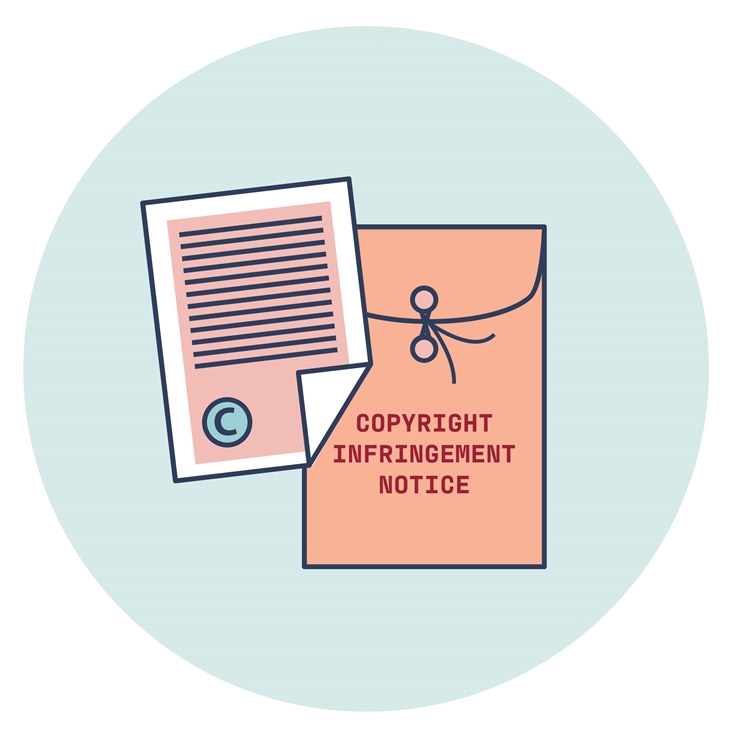Annual Copyright Infringement Notice
Texas A&M recently fought a court battle regarding their right to release an author's unpublished book chapter on their website. The University of Houston was sued after using a photographer's image without attribution or compensation. Copyright cases like these highlight the continued importance of understanding copyright infringement for students, faculty and staff in higher education.
Using materials in an educational context does not mean students, faculty and staff can forget about copyright. For example, let's say a professor wants to begin a faculty meeting with a clip from the 2021 film Licorice Pizza, but most popular streaming services are intended for personal, private use only. Although the scene is available on YouTube, the professor cannot bypass proper permissions. She would still be responsible for identifying the film's producer and the appropriate contact for permission requests. However, the U.S. Copyright Office states it is not necessary to obtain permission if the professor shows the movie in "face-to-face teaching activities" in class, as long as the copy of the movie being shown is a lawful copy.
It is a violation of the university's Code of Computing Practices for any user to commit copyright infringement using university resources, including campus or residence hall networks. Violation of the Code of Computing Practices is also a violation of the Code of Student Life and may result in disciplinary sanctions as well as the suspension or revocation of the user's access to university resources or networks (Code of Computing Practices, Sections III.E.2).
As part of the Higher Education Opportunity Act's institutional requirements for combating unauthorized distribution of copyrighted material by network users, the university is required to provide information pertaining to copyright infringement.
What is Copyright Infringement?
Copyright infringement is the act of exercising any rights granted to the copyright owner without permission or legal authority (Title 17, United States Code, Section 106 of the Copyright Act). Copyright owners have exclusive rights of reproduction, adaptation, publication, performance and display. Infringement includes the reproduction or distribution of a copyrighted work in the following ways:
- While downloading a file using file sharing applications.
Using the copyrighted content for any purpose may put the user in violation of policy as content of the file is distributed. Doing anything with copyrighted content on a peer-to-peer network potentially puts the user in violation of this policy. - Downloading or uploading parts of a copyrighted work without authority.
Downloading or uploading large parts of a copyrighted work without authority constitutes as an infringement. Willful copyright infringement can result in criminal penalties including imprisonment of up to five years and fines of up to $250,000 per offense. - Downloading and distributing copyrighted material
Users engaged in the distribution of copyrighted material are subject to fines. Penalties include imprisonment of up to 10 years and fines of up to $250,000. For example, a person who lawfully acquires an authorized copy of a motion picture would be an infringer if he or she engages in the business of renting it to others for an unauthorized public performance.
Copyright infringement can also result in civil and criminal penalties. Anyone found liable for civil copyright infringement can be ordered to pay damages, with fines ranging from $750 to $30,000 per work infringed. For "willful" infringement, a court may award up to $150,000 per work infringed. A court can also assess costs and attorneys' fees (Title 17, United States Code, Sections 504, 505).
To learn more about how the university combats unauthorized distribution of copyrighted material, see its.uark.edu/policies/copyright. The library also has created a copyright and fair use guide: uark.libguides.com/CopyrightandFairUse. Furthermore, the Higher Education Opportunity Act requires all colleges and universities to offer legal alternatives to unauthorized downloading.
Topics
Contacts
Rachel Gerner, content strategist
University Information Technology Services
479-387-3824,
rgerner@uark.edu
Headlines
PetSmart CEO J.K. Symancyk to Speak at Walton College Commencement
J.K. Symancyk is an alumnus of the Sam M. Walton College of Business and serves on the Dean’s Executive Advisory Board.
Faulkner Center, Arkansas PBS Partner to Screen Documentary 'Gospel'
The Faulkner Performing Arts Center will host a screening of Gospel, a documentary exploring the origin of Black spirituality through sermon and song, in partnership with Arkansas PBS at 7:30 p.m. Thursday, May 2.
UAPD Officers Mills and Edwards Honored With New Roles
Veterans of the U of A Police Department, Matt Mills has been promoted to assistant chief, and Crandall Edwards has been promoted to administrative captain.
Community Design Center's Greenway Urbanism Project Wins LIV Hospitality Design Award
"Greenway Urbanism" is one of six urban strategies proposed under the Framework Plan for Cherokee Village, a project that received funding through an Our Town grant from the National Endowment for the Arts.
Spring Bike Drive Refurbishes Old Bikes for New Students
All donated bikes will be given to Pedal It Forward, a local nonprofit that will refurbish your bike and return it to the U of A campus to be gifted to a student in need. Hundreds of students have already benefited.





